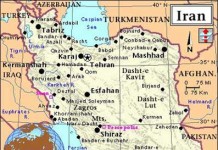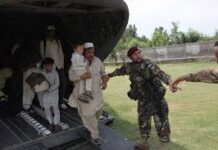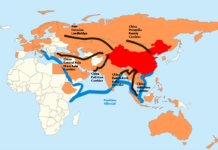Context
 By Daud Khattak
By Daud Khattak
If President Hamid Karzai, after his two-day Islamabad trip, headed back to Kabul with a hope, his host and interlocutor Nawaz Sharif was left with the first serious test for his newly-elected government in the Pakistani capital.
The Afghan president landed in Pakistan with the hope that his neighbor will undertake serious efforts to persuade the warring Taliban for direct talks with his government, and he got the assurances of ‘all possible help’ in this regard.
Nawaz Sharif, the third time Prime Minister of Pakistan, on his part, wants an ‘Afghan-led and Afghan-owned’ peace and reconciliation process in Afghanistan. But can his government guarantees such a process without getting a nod from his country’s strong army and intelligence apparatus, together referred to as the security establishment
Analysis
Hamid Karzai’s agreeing to visit Islamabad after tense relations for more than a year and exchange of serious allegations and counter-allegations from both sides in itself is a proof that the two neighboring countries are once again coming closer to take serious steps for regional peace and security and counter the scourge of extremism and terrorism afflicting people of both countries alike.
However, to believe that this will prove a landmark change in the troubled relationship of the two neighbors is anybody’s guess. Consider!
a) President Hamid Karzai, wrongly or rightly believe that the Taliban or their top leadership at least, is under the control of Pakistan army. He was angry at his American partners, the Qatari government and his Pakistani neighbors for keeping him out of the Doha peace process. The thinking about Karzai both in the US and Pakistani sides, on the other hand, is being of a spoiler rather than a peace maker.
Though the Pakistani side assured the Afghan president of all possible help, the narrow thread binding Karzai and Nawaz Sharif is going to break the moment Taliban refuse to sit face to face with the Afghan government.
b) The Taliban leadership, mostly hiding in Pakistan, never accepted Hamid Karzai as the legitimate president of Afghanistan and it seems a distant possibility that they will accept him now, mainly because his second term in office is going to expire in less than a year time.
Even if the Pakistanis sincerely try to persuade Taliban for talks with Karzai, it is unlikely they (Taliban) will agree mainly because they know very well that their Pakistani well-wishers can not take the risk of annoying the Taliban at this crucial time when the international forces are preparing for the Afghan withdrawal.
c) The Pakistani support for afghan peace talks is not without pre-conditions. Pakistan’s top most concern is the Indian presence in its backyard. The thinking, which has become a paranoia on both sides, in Pakistan’s security establishment is that of encirclement by its much larger eastern neighbor (India) using the soil of Afghanistan.
The sweets of support for Taliban talks mixed up with Pakistani concern over Indian role in Afghanistan might have left a bitter taste in Hamid Karzai’s mouth. The decision to swallow or spit it out will be taken only when the Afghan leader meets his key advisors and cabinet members in his fortified capital in the next few days.
d) The fourth and perhaps the most important factor in this new unfolding scenario between Afghanistan and Pakistan, is the role of the newly-elected Pakistani prime minister and that of his country’s powerful security establishment.
Over the years, the thinking among the Pakistani security establishment about its impoverished western neighbor is that of a place where they can seek strategic depth mostly against its arch rival India.
Whether Nawaz Sharif, who was twice removed from power – once by the then president with behind the scene support from the army and another time in a direct military coup by his handpicked general Pervez Musharraf – would be able to stand up to the army and sincerely implement his government policy of ‘non-interference’ in Afghanistan’
Empirical evidences suggest that successive elected governments in Pakistan from Benazir Bhutto (1988) to that of her widower Asif Ali Zardari (2013) have adopted the hands off approach in front of the army on foreign policy issues vis-à-vis India and Afghanistan. Only the next few years will prove if Nawaz Sharif is different than his previous two terms as well as his predecessors.
However to judge by his election campaign statements and his first address to the nation after taking oath as prime minister of Pakistan, many see a ray of hope, particularly when it comes to the decades of rivalry and an unnecessary arms race with India and relations with Afghanistan which in itself is an encouraging sign for regional peace and stability.
In many respects, India and Afghanistan are almost inter-connected in Pakistan’s foreign policy approaches. Any improvement in India-Pakistan relations will automatically leave its effects on peace and security in Afghanistan.
Afghanistan, which can rightly be called a victim of its geography, will benefit from confidence-building between the two South Asian nuclear powers and in an ideal situation, their approach might shift to positive competition and cooperation rather than confrontation. President Hamid Karzai, in this regard, may also play a bridge role between the two sides mainly because of his strong connections with India and close neighborly relations with Pakistan.
However, that will need years, if not decades to reach that point of cooperation. The immediately needed approach on part of Afghanistan and Pakistan in particular and the neighbors and the international community in general is how to put and end to the ongoing war in Afghanistan and curb the spread of extremism and terrorism in the region.
Though hopes are high following the warm welcome extended to Hamid Karzai in Islamabad on August 26, only a high degree of restraints, tolerance and maturity on part of the Afghan and Pakistani leadership can help paving way for another step forward.
 Daud Khattak is a Senior Editor with Radio Free Europe Radio Liberty.
Daud Khattak is a Senior Editor with Radio Free Europe Radio Liberty.



